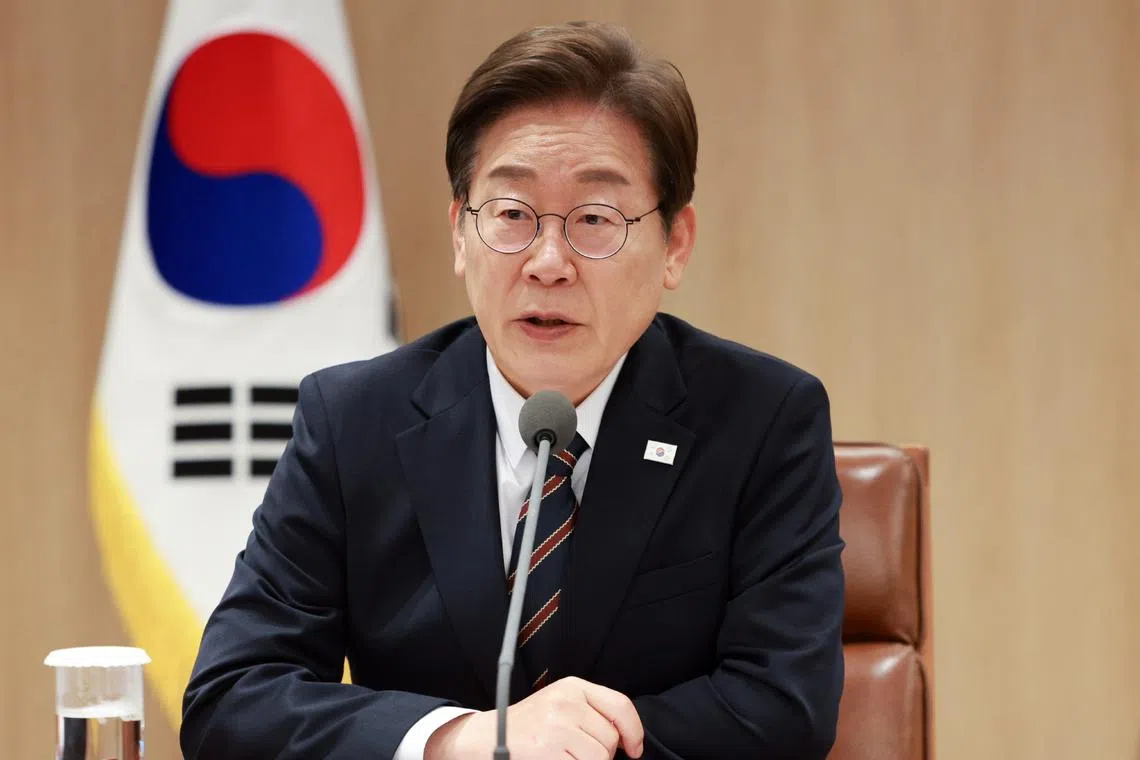South Korean President Lee to meet chaebol heads in bid to revive economy
Sign up now: Get insights on Asia's fast-moving developments

The sit-down is Mr Lee Jae-myung's first with the nation’s powerful business leaders since winning the presidency last week.
PHOTO: EPA-EFE
Follow topic:
SEOUL – South Korean President Lee Jae-myung will meet the heads of the country’s biggest conglomerates on June 13, as he seeks to jumpstart a flagging economy while navigating tensions over his reform agenda aimed at curbing the dominance of chaebols over the corporate landscape.
The meeting is scheduled for 10am local time at Mr Lee’s office and will include the chiefs of Samsung Group, SK Group, Hyundai Motor, LG, and Lotte, according to a statement from the presidential office. Local media reported that Mr Lee would seek cooperation from the chaebols.
The sit-down marks his first with the nation’s powerful business leaders since winning the presidency last week.
Mr Lee, who defeated his conservative rival to become South Korea’s new president, has made economic revitalisation one of his top priorities. The country’s chaebols, sprawling family-controlled conglomerates, such as Samsung and Hyundai, have long been the economy’s main engine of growth, giving them outsized influence in business and society.
The new leader faces a delicate balancing act as he seeks to harness chaebol strength to fuel growth while also following through on pledges to rein in their power over Asia’s fourth-largest economy. The top five chaebols accounted for nearly half of GDP in 2022.
Mr Lee is likely to seek support for his agenda aiming to revive consumer confidence and boost business sentiment. He has pledged to pursue “pragmatic market principles”, roll out a 35 trillion won (S$32.9 billion) stimulus package, expand housing supply and enhance labour protections.
The meeting will provide an opportunity to discuss trade and US President Donald Trump’s tariffs ahead of Mr Lee’s visit to Canada to attend the Group of Seven summit next week.
South Korea remains a critical player in global supply chains, producing everything from smartphones and semiconductors to ships and electric vehicles. As such, leading exporters including Hyundai and Samsung are especially vulnerable to disruptions in global commerce.
Hyundai Motor, one of the world’s biggest automakers, has pledged to invest US$21 billion in the US. Even so, it may face yet another hike in duties after Mr Trump said on June 12 that he was considering raising auto tariffs from their current 25 per cent level in order to protect the domestic industry.
While Mr Lee looks to chaebols to help the economy regain momentum, his reformist stance may spark friction.
Aside from curbing the dominance of chaebols, Mr Lee has also pledged to rewrite the commercial code to weed out the rubber-stamping of corporate decisions by directors. The revised code aims to strengthen board fiduciary duty to shareholders to improve corporate governance and tackle the so-called Korea discount that has been a longstanding grievance among global investors.
The proposed revision drew swift pushback from industry groups. A coalition of eight major business lobbies, including the Korea Chamber of Commerce and Industry, issued a statement earlier in 2025, saying that while they support capital market development, the measure would impose excessive restrictions and stifle growth.
They warned that the move could damage the business climate and worsen the Korea discount by enabling activist funds to file frivolous lawsuits and challenge corporate control with speculative capital. Bloomberg

